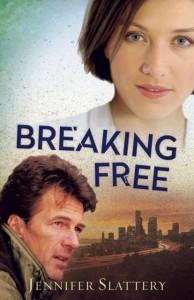Today my guest is Jennifer Slattery. She gives powerful suggestions to help us strengthen our stories. Be sure to learn more about her novel, Breaking Free, at the end of her post.
Jennifer:
When stories fall flat, more often than not, one can trace this back to a few key issues: The characters’ goals aren’t clear or compelling enough, the stakes aren’t high enough, or the story hasn’t presented a sense of urgency.
Character goals tell the reader what they’re rooting for.
Your character needs story goals (one abstract and one concrete that he believes will help him attain his abstract goal) and numerous scene goals. Because without clear and compelling goals, everything else becomes noise. For this reason, readers should know the character’s goals as soon as possible, preferably in the first page. And you can add hints within the first paragraph.
Let’s look at an example from a well-known book, The Hunger Games by Suzanne Collins. Katniss wants freedom (from oppression and starvation for her, her family, and her district). This is her abstract goal. She believes winning the Hunger Games (her concrete goal) will help her achieve that freedom. So you see, both are important. Without an abstract goal, the concrete goal lacks oomph, but without the concrete goal, we have nothing to root for. The two work together.
High stakes makes us care.
According to Randy Ingermanson, in order for the reader to truly care, the stakes need to potentially lead to the death of something: a career, a relationship, life itself. In our example, the stakes are two-fold: a life of oppression, so the death of freedom, and once Katniss enters the arena, quite literally, death.
This is one of the reasons the Hunger Games sold over 9.2 million copies and became a box office hit. Collins presented clear and compelling concrete and abstract goals, strong scene goals in each and every scene, which is also important, and continually rising stakes.
Collins also infused nearly every page with a sense of urgency. (This is something James Patterson does really well also.)
A sense of urgency propels readers forward.
Imagine you have two stories. In one, your main character wants to earn money to buy groceries. Not very interesting, right? What if she needs to earn money to buy groceries for her kids before social workers come for a visit to potentially remove her children from her home?
Which story would you be more apt to keep reading?
Without clear & compelling goals in your story, everything else becomes noise. Click to tweet.
What are your thoughts on today’s post? Can you share any examples of a novel that uses all three of these story components well? Share your thoughts in the comments below, because we can all learn from each other.
 Jennifer Slattery writes soul-stirring fiction for New Hope Publishers, Christian living articles for Crosswalk.com, and devotions for Internet Café Devotions, the group blog, Faith-filled Friends, and her personal blog. She also does content editing for Lighthouse Publishing of the Carolinas’ Firefly imprint, and loves working with authors who are serious about pursuing their calling. When not writing, reading, or editing, Jennifer loves going on mall dates with her adult daughter and coffee dates with her hilariously fun husband.
Jennifer Slattery writes soul-stirring fiction for New Hope Publishers, Christian living articles for Crosswalk.com, and devotions for Internet Café Devotions, the group blog, Faith-filled Friends, and her personal blog. She also does content editing for Lighthouse Publishing of the Carolinas’ Firefly imprint, and loves working with authors who are serious about pursuing their calling. When not writing, reading, or editing, Jennifer loves going on mall dates with her adult daughter and coffee dates with her hilariously fun husband.
Visit with Jennifer online at JenniferSlatteryLivesOutLoud.com and connect with her on Facebook at http://www.facebook.com/JenSlatte
Sometimes it takes losing everything to grab hold of what really matters.
Women’s ministry leader and Seattle housewife, Alice Goddard, and her successful graphic-designer husband appear to have it all together. Until their credit and debit cards are denied, launching Alice into an investigation that only leads to the discovery of secrets. Meanwhile, her husband is trapped in a downward spiral of lies, shame, and self-destruction. Can they break free from their deception and turn to the only One who can save them? And will it be in time to save their marriage?
Read a free, 33-page excerpt here: http://newhopepublishers.com/2016/02/free-sample-of-breaking-free/
Buy it:
Christian Book Distributors: http://www.christianbook.com/breaking-free-a-comtemporary-romance-novel/jennifer-slattery/9781596694682/pd/694682?event=ESRCG
Barnes and Noble: http://www.barnesandnoble.com/w/breaking-free-peter-maxwell-slattery/1119735612?ean=9781596694682
Amazon: http://www.amazon.com/Breaking-Free-Jennifer-Slattery/dp/1596694688/ref=asap_bc?ie=UTF8






 RSS - Posts
RSS - Posts



Jennifer!!! It is so great to see you here. I love this post. Great advice. Thanks!
Sally, Jennifer’s advice is great. I just wrote down my heroine’s abstract and concrete goals for my new manuscript.
Zoe, how fun to be in that “new manuscript” stage! I love, love, love the brainstorming and first draft stage! I love getting lost in a world of my own making! haha. Have a great week’s end and weekend! And thanks so much for having me on your site!
Hi, Sally! Thanks for taking the time to pop in and say hi! I’m glad you liked today’s post, and it’s always fun to see your smiling face. 🙂
You’re welcome, Jennifer. I’m glad to have you and your wisdom.
Nice to read the interview. Good points, Jennifer. Intertwined is in my TBR pile.
Hi, LoRee, so fun to see you here! Thanks for the encouraging comment to my post, and for buying a copy of “Intertwined!” I hope you enjoy it!
Great article. Thanks for sharing good advice!
It is helpful advice, Sheryl. Thank you for stopping by.
Hi, Sheryl, I’m glad you found my post helpful. Happy writing, and have a great weekend!
Thank you, Jennifer. I’m working over those points, again, on an “old” manuscript on which I am, hopefully, close to final editing, trying to make sure my protagonists’ goals are clear and compelling enough. I wish you had some magic glasses to pass out to make it easy to see it in our own work!
Hi, Jane!
Good for you for persevering in polishing your novel. Your comment on magic glasses made me smile. Do you have critique partners? I rely heavily on mine and will often ask them if certain elements stand out or are clear.